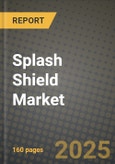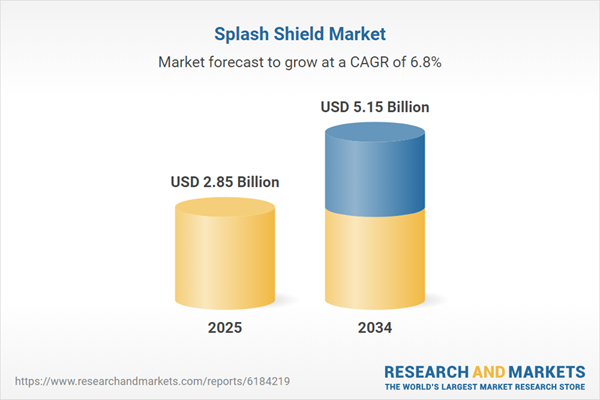Splash Shield Market
The splash shield market (also called engine splash guard, underbody shield, fender liner, wheelhouse liner, or mud/splash guard depending on location) supports OEM and aftermarket demand for protective components that stop water, stones, mud, road salt and debris from entering the engine bay, wheel wells and underbody areas. These parts also help with aerodynamics, noise reduction and thermal management, so they are no longer just simple plastic covers. Growth is tied to global vehicle production, higher adoption of underbody sealing on SUVs and crossovers, stricter NVH expectations, and the push to protect increasingly dense front-end electronics, ADAS sensors and battery/cooling components on hybrids and EVs. OEMs are moving from heavier metal or thick plastics to lighter, formable thermoplastics (PP, TPO, HDPE) and nonwoven or felt-based liner systems that combine splash protection with acoustic absorption. At the same time, rising minor-collision and curb-impact repairs feed a large replacement and aftermarket segment, especially in regions with poor roads or snowy/wet climates. Tier suppliers compete on dimensional accuracy, impact resistance, fastener integration, recyclability and cost, while automakers want shields that are easy to assemble, compatible with service access, and resistant to chemicals and high-pressure washing. As underbody airflow becomes a lever for range in EVs, designers increasingly treat splash shields as part of the aero package, not a disposable trim part.Splash Shield Market Key Insights
- Vehicle parc expansion is the base driver. More SUVs, crossovers and light trucks on the road mean more wheelhouse liners and underbody shields per vehicle, plus a sizeable collision-repair opportunity over the vehicle life.
- Protection needs are rising. Modern engine bays hold ADAS ECUs, sensors, harnesses and cooling lines close to the front; shields must now block water, salt and gravel more effectively than older designs.
- Lightweight, moldable plastics dominate. OEMs favor PP/TPO and composite or textile-backed parts that give form plus acoustic damping while staying compatible with mass-production tooling.
- Acoustic and aero functions add value. Shields double as noise absorbers in wheel wells and as underbody panels that smooth airflow and improve fuel economy or EV range.
- EVs and hybrids reinforce demand. Battery trays, high-voltage cables and more complex thermal loops under the vehicle need extra protection from water and stone impact.
- Aftermarket is large and fast-moving. Splash shields often crack, tear off, or are lost in minor impacts; collision shops and DIY channels need exact-fit, low-cost replacements.
- Ease of assembly and service access matter. Integrated clips, standardized fasteners and removable service doors reduce OEM line time and make dealer service simpler.
- Material sustainability is emerging. Automakers are asking for recycled content, mono-material designs for end-of-life, and resistance to bio-based road de-icers.
- Regional environment shapes specs. Cold, wet, or unpaved-road markets need tougher, thicker shields with better anti-corrosion fasteners; hot-climate markets prioritize heat and chemical resistance.
- Localization of tooling and supply helps. Because shields are bulky and model-specific, near-plant production or regional thermoforming/injection capacity keeps logistics costs down.
Splash Shield Market Reginal Analysis
North America
High mix of pickups, SUVs and crossovers underpins strong OEM and aftermarket demand for wheelhouse liners and underbody panels. Winter road salt and gravel create higher wear and breakage, so collision/insurance channels are active. OEMs prioritize lightweight molded plastics, fast installation and corrosion-resistant clips.Europe
Stringent NVH, pedestrian-protection and aero requirements make integrated wheel-arch liners and smooth underbody panels standard, even on compact cars. Recycled plastics and felt/nonwoven acoustic liners are widely used. Replacement demand comes from curb and winter damage, especially in Northern Europe.Asia-Pacific
The volume center, driven by large passenger-car and SUV production in China, India, Japan and Korea. Cost-efficient PP/TPO shields dominate; local suppliers focus on weight reduction and tool localization. Poorer road conditions in parts of ASEAN and India create a healthy aftermarket for exact-fit fender liners.Middle East & Africa
Hot, dusty conditions and mixed road quality require shields that resist sand abrasion, heat and fluid exposure. Imports and CKD/IKD vehicle assembly create demand for localized, durable shield production. Fleet and off-road vehicle operators often replace damaged shields with reinforced versions.South & Central America
Uneven roads, speed bumps and flooding in the rainy season cause frequent shield breakage, supporting aftermarket and collision-repair sales. OEMs look for robust, low-cost plastics and simple fastener systems that can be serviced easily. Local tier suppliers with flexible tooling and short runs can win on new or refreshed models.Splash Shield Market Segmentation
By Application
- Engine Components
- Breaks
By Type
- Single
- Twin
By Manufacturing Material
- Plastic
- Fiberglass
- Metal
By Vehicle
- Passenger Vehicles
- Light Commercial Vehicles
- Heavy Commercial Vehicles
- Electric/Hybrid Vehicles
By Distribution Channel
- OEM
- Aftermarket
Key Market players
Magna International Inc., Plastic Omnium SE, FORVIA (Faurecia), Toyota Boshoku Corporation, FLEX-N-GATE Corporation, SRG Global Inc., Yanfeng Automotive Interiors, Hyundai Mobis Co. Ltd., Aisin Corporation, Gestamp Automoción S.A., Motherson Group, CIE Automotive S.A., Valeo S.A., DURA Automotive Systems, Linamar Corporation,Splash Shield Market Analytics
The report employs rigorous tools, including Porter’s Five Forces, value chain mapping, and scenario-based modelling, to assess supply-demand dynamics. Cross-sector influences from parent, derived, and substitute markets are evaluated to identify risks and opportunities. Trade and pricing analytics provide an up-to-date view of international flows, including leading exporters, importers, and regional price trends.Macroeconomic indicators, policy frameworks such as carbon pricing and energy security strategies, and evolving consumer behaviour are considered in forecasting scenarios. Recent deal flows, partnerships, and technology innovations are incorporated to assess their impact on future market performance.
Splash Shield Market Competitive Intelligence
The competitive landscape is mapped through proprietary frameworks, profiling leading companies with details on business models, product portfolios, financial performance, and strategic initiatives. Key developments such as mergers & acquisitions, technology collaborations, investment inflows, and regional expansions are analyzed for their competitive impact. The report also identifies emerging players and innovative startups contributing to market disruption.Regional insights highlight the most promising investment destinations, regulatory landscapes, and evolving partnerships across energy and industrial corridors.
Countries Covered
- North America - Splash Shield market data and outlook to 2034
- United States
- Canada
- Mexico
- Europe - Splash Shield market data and outlook to 2034
- Germany
- United Kingdom
- France
- Italy
- Spain
- BeNeLux
- Russia
- Sweden
- Asia-Pacific - Splash Shield market data and outlook to 2034
- China
- Japan
- India
- South Korea
- Australia
- Indonesia
- Malaysia
- Vietnam
- Middle East and Africa - Splash Shield market data and outlook to 2034
- Saudi Arabia
- South Africa
- Iran
- UAE
- Egypt
- South and Central America - Splash Shield market data and outlook to 2034
- Brazil
- Argentina
- Chile
- Peru
Research Methodology
This study combines primary inputs from industry experts across the Splash Shield value chain with secondary data from associations, government publications, trade databases, and company disclosures. Proprietary modeling techniques, including data triangulation, statistical correlation, and scenario planning, are applied to deliver reliable market sizing and forecasting.Key Questions Addressed
- What is the current and forecast market size of the Splash Shield industry at global, regional, and country levels?
- Which types, applications, and technologies present the highest growth potential?
- How are supply chains adapting to geopolitical and economic shocks?
- What role do policy frameworks, trade flows, and sustainability targets play in shaping demand?
- Who are the leading players, and how are their strategies evolving in the face of global uncertainty?
- Which regional “hotspots” and customer segments will outpace the market, and what go-to-market and partnership models best support entry and expansion?
- Where are the most investable opportunities - across technology roadmaps, sustainability-linked innovation, and M&A - and what is the best segment to invest over the next 3-5 years?
Your Key Takeaways from the Splash Shield Market Report
- Global Splash Shield market size and growth projections (CAGR), 2024-2034
- Impact of Russia-Ukraine, Israel-Palestine, and Hamas conflicts on Splash Shield trade, costs, and supply chains
- Splash Shield market size, share, and outlook across 5 regions and 27 countries, 2023-2034
- Splash Shield market size, CAGR, and market share of key products, applications, and end-user verticals, 2023-2034
- Short- and long-term Splash Shield market trends, drivers, restraints, and opportunities
- Porter’s Five Forces analysis, technological developments, and Splash Shield supply chain analysis
- Splash Shield trade analysis, Splash Shield market price analysis, and Splash Shield supply/demand dynamics
- Profiles of 5 leading companies - overview, key strategies, financials, and products
- Latest Splash Shield market news and developments
Additional Support
With the purchase of this report, you will receive:- An updated PDF report and an MS Excel data workbook containing all market tables and figures for easy analysis.
- 7-day post-sale analyst support for clarifications and in-scope supplementary data, ensuring the deliverable aligns precisely with your requirements.
- Complimentary report update to incorporate the latest available data and the impact of recent market developments.
This product will be delivered within 1-3 business days.
Table of Contents
Companies Mentioned
- Magna International Inc.
- Plastic Omnium SE
- FORVIA (Faurecia)
- Toyota Boshoku Corporation
- FLEX-N-GATE Corporation
- SRG Global Inc.
- Yanfeng Automotive Interiors
- Hyundai Mobis Co. Ltd.
- Aisin Corporation
- Gestamp Automoción S.A.
- Motherson Group
- CIE Automotive S.A.
- Valeo S.A.
- DURA Automotive Systems
- Linamar Corporation,
Table Information
| Report Attribute | Details |
|---|---|
| No. of Pages | 160 |
| Published | November 2025 |
| Forecast Period | 2025 - 2034 |
| Estimated Market Value ( USD | $ 2.85 Billion |
| Forecasted Market Value ( USD | $ 5.15 Billion |
| Compound Annual Growth Rate | 6.8% |
| Regions Covered | Global |
| No. of Companies Mentioned | 15 |









